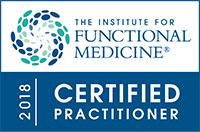Sleep is a cornerstone of optimal health – too much or too little can cause imbalance.
A recent study examined the association between sleep duration and cognitive function among adults aged 45 years and older. Findings show that both short and long sleep durations were associated with decreased cognitive function compared to the optimal sleep duration of 7-8 hours per night. Participants who slept less than 4 hours or more than 10 hours per night had the lowest cognitive function scores, with the strongest association seen for short sleep duration.
This study and others like it add to a growing body of research linking sleep duration to various health outcomes and highlights the need for public health interventions that promote healthy sleep habits.
Try implementing some of these tips for high quality sleep:
- Stick to a consistent sleep schedule: Try to go to bed and wake up at the same time every day, even on weekends.
- Create a relaxing sleep environment: Make your bedroom dark, quiet, and cool.
- Consider using a white noise machine or earplugs if you are sensitive to noise.
- Limit screen time before bed: The blue light emitted by electronic devices can interfere with your body’s natural sleep-wake cycle. Try to avoid screens for at least an hour before bed.
- Practice relaxation techniques: Activities such as meditation or deep breathing exercises can help calm your mind and body before bed.
- Avoid caffeine and alcohol – these substances can interfere with your sleep quality, so try to avoid them, especially in the hours leading up to bedtime.
- Exercise regularly: Regular physical activity can help you fall asleep faster and enjoy deeper sleep. Just make sure to avoid exercising too close to bedtime, as it can have the opposite effect.
- Eat a balanced diet: Eating a healthy diet rich in whole foods can help promote better sleep. Avoid heavy or spicy meals close to bedtime.
By incorporating these tips into your daily routine, you can improve the quality of your sleep and promote better overall health and well-being.


